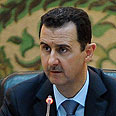
Russia's foreign minister said that the UN-brokered peace plan for Syria agreed on by major powers does not require the ouster of President Bashar Assad.
Related articles:
- 'Russia says is not against Assad's departure
'
- Putin arrives in Israel, inaugurates WWII memorial
- Russia defends weapons sales to Syria
Sergey Lavrov said there was "no attempt in the document to impose on the Syrian people any type of transitional process."
Moscow had refused to back a provision that would call for Assad to step aside, insisting that outsiders cannot order a political solution for Syria.
The US backed away from demands that Assad be excluded, hoping the concession would encourage Russia to put greater pressure on its longtime ally to end the violent crackdown that the opposition says has claimed over 14,000 lives.
US Secretary of State Hillary Clinton insisted that Assad would still have to go, saying "it is now "incumbent on Russia and China to show Assad the writing on the wall."
Moscow had refused to back a provision that would call for Assad to step aside, insisting that outsiders cannot order a political solution for Syria.
Syria envoy Kofi Annan said following talks that "it is for the people of Syria to come to a political agreement."
"I will doubt that the Syrians who have fought so hard to have independence ... will select people with blood on their hands to lead them," he said.
The envoy earlier warned the permanent members of the UN Security Council – Britain, China, France, Russia and the United States – that if they fail to act at the talks hosted by the United Nations at its European headquarters in Geneva, they face an international crisis of "grave severity" that could spark violence across the region and provide a new front for terrorism.
"History is a somber judge and it will judge us all harshly, if we prove incapable of taking the right path today," he said.
"While many spoke of united support for one ... some simultaneously took national or collective initiatives of their own, undermining the process. This has fueled uncertainty in Syria, in turn fueling the flames of violence," Annan said. "By being here today, you suggest the intention to show that leadership. But can you, can we follow through?"
He said that "the way things have been going thus far _ we are not helping anyone. Let us break this trend and start being of some use."
The United Nations says violence in the country has worsened since a cease-fire deal in April, and the bloodshed appears to be taking on dangerous sectarian overtones, with growing numbers of Syrians targeted on account of their religion. The increasing militarization of both sides in the conflict has Syria heading toward civil war.
- Receive Ynetnews updates
directly to your desktop















